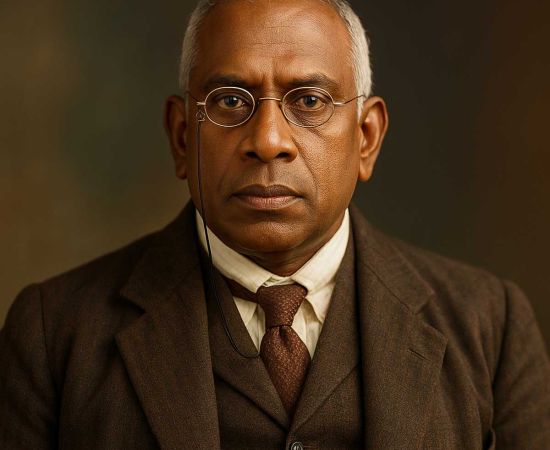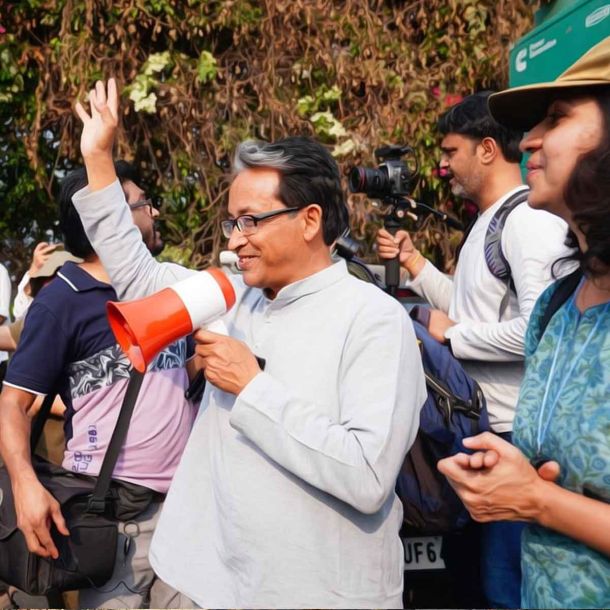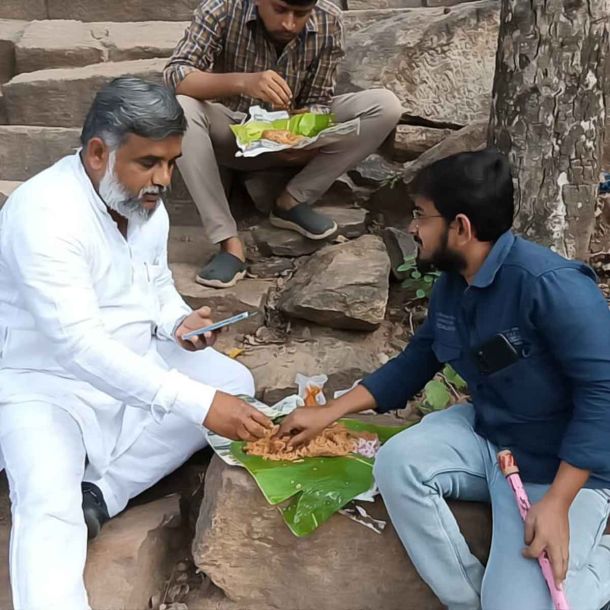MORE COVERAGE
Twitter Coverage
Satyaagrah
Written on
Satyaagrah
Written on
Satyaagrah
Written on
Satyaagrah
Written on
Satyaagrah
Written on
JOIN SATYAAGRAH SOCIAL MEDIA
"पलट पलट पलट": A shocking attempt to sabotage an Army Special Train in Burhanpur uncovered when railway staffer Sabir planted 10 detonators on the tracks, prompting a swift, high-level investigation by NIA, and ATS, leading to disturbing new revelations

In a disturbing turn of events, a railway employee, Sabir, has been taken into custody in connection with the detonator blast on a railway track in Burhanpur, Madhya Pradesh. Sabir is believed to have planted 10 detonators on the tracks, raising alarms among both local authorities and national security agencies. The arrest has sparked an ongoing investigation, with officials still trying to determine whether Sabir's actions were merely an act of mischief or part of a more sinister, larger conspiracy. At present, the National Investigation Agency (NIA), the Anti-Terrorism Squad (ATS), the Railway Protection Force (RPF), and the Ministry of Railways are all deeply involved in probing this case to uncover the full extent of the plan behind the incident.
|
The explosion occurred in Sagfata, a small locality within the Nepanagar Assembly constituency of Burhanpur, on September 18. As the Army Special Train, carrying personnel from Jammu and Kashmir to Karnataka, sped down the track, the detonators went off. Fortunately, the loco pilot acted swiftly upon hearing the explosion. He immediately brought the train to a halt and alerted the station master, preventing what could have been a catastrophic accident. The situation could have spiraled into a significant disaster, but thanks to the prompt actions of the pilot, a potential tragedy was averted.
It has now been confirmed that a total of 10 detonators were strategically placed on the railway track, timed to explode as the train passed. While the detonators successfully exploded, the impact was fortunately limited. The Army Special Train was brought to a stop in time, causing a delay of only a couple of minutes. Nevertheless, this two-minute delay, caused by an explosion on the track near Sagphata between Nepanagar and Khandwa stations, has triggered immense concern within the Bhusawal division and beyond. The incident occurred as the military special train passed over the tracks, sparking investigations by numerous security agencies to determine whether this act was an isolated incident or linked to a broader threat.
Authorities are currently focusing on uncovering every possible detail related to Sabir's involvement and what may have motivated him to plant the detonators. Was it just a random act of mischief, or was it the beginning of a larger, well-orchestrated attack? As investigations unfold, all eyes are on Burhanpur as officials work to ensure the safety of both railway personnel and the countless passengers who rely on this critical transportation network daily.
A railway patrol duty staffer, Sabir, has been taken into custody in connection with the alarming incident involving the detonators, as confirmed by the Railway Protection Force (RPF). Sabir, who holds the position of a mate, a rank slightly higher than a gangman, was responsible for patrolling the railway tracks in the area where the blast took place. The RPF inspector, Sanjeev Kumar of Khandwa, provided more details about the case: "We have registered a case against one Sabir on Sunday for stealing the detonators under section 3 (a) of the Railway Property (Unlawful Possession) Act," Kumar told PTI, stressing the seriousness of the crime.
Despite his critical role in ensuring the safety of the tracks, Sabir was found to be involved in the theft of the detonators. It is still unclear how he managed to obtain them, as these devices are typically controlled by a very limited number of government departments. "Only two or three government departments have these detonators, and they were not issued to the accused officially," said Kumar, indicating that Sabir had no legitimate reason to be in possession of the explosives.
To make matters worse, Sabir reportedly told officials during questioning that he was not on duty on the day of the incident and that he had been drunk when the blast occurred. His absence from duty, paired with the fact that he was intoxicated, raises even more concerns about his role in this dangerous event. The authorities are still investigating the situation to determine whether Sabir's actions were the result of negligence or if there was a deeper, more malicious intent behind the crime.
|
In addition to Sabir, another railway staffer was also questioned in connection with the incident. However, after the questioning, the RPF let him go, although they served him a notice as part of the procedure. The investigation into Sabir's involvement remains ongoing, and the authorities are leaving no stone unturned to uncover the truth.
Providing some more clarity on the detonators, Central Railway’s chief public relations officer, Swapnil Nila, explained that the railways regularly use these devices, commonly referred to as "crackers." When detonated, these crackers create a loud sound, which serves as a warning signal to the train's crew, alerting them to possible obstructions, fog, or mist on the track. These loud blasts are essential in maintaining railway safety, especially during difficult weather conditions.
At the time of the incident, a military special train was passing through Khandwa, as confirmed by another senior railway official. The situation could have easily escalated into a major disaster had it not been for the quick actions of the loco pilot, who managed to stop the train in time.
"After the warning signal or ten detonators on the track went off, our deputy station superintendent (Sagphata) heard the sound. He got the military special halted and got things checked. The train was allowed to proceed in just two minutes," said a railway official. The quick response by the station superintendent was critical in preventing what could have been a much more dangerous situation. The military special train was stopped immediately after the explosion, and a thorough inspection was carried out before the train was permitted to continue on its journey. In just two minutes, the situation was brought under control, thanks to the swift actions of the railway staff.
Since the explosion, the investigation into the incident has been thorough, involving multiple agencies such as the Anti-Terrorism Squad (ATS), the National Investigation Agency (NIA), and the local railway and police authorities. Given that the incident involved an army train, the investigation has been conducted with "utmost secrecy", indicating the sensitivity of the case. The authorities are leaving no room for error as they work to uncover whether this was an isolated act or part of something more serious. The involvement of such high-level investigative agencies also suggests the gravity of the situation and the potential threat posed by such incidents.
|
Dr. Swapnil Neela, the Chief Public Relations Officer of Central Railways, shared crucial information regarding the nature of the detonators found on the tracks. He explained that these detonators are, in fact, part of the railway’s standard safety procedures. However, their placement at the location where they were found was highly irregular, and there was no legitimate reason for them to be there. Detonators are commonly used by the railways to produce loud warning sounds, particularly in situations involving fog or other visibility issues. When a train needs to be stopped in an emergency or adverse weather conditions, detonators are deployed to alert the crew by creating a loud explosion as the train passes over them. Typically, three detonators are placed at intervals of 1,200 meters ahead of the location where the train must stop.
These safety devices are made available to various railway employees, including station masters, loco pilots, keymen, and track safety officers, ensuring that they can be used whenever necessary to protect passengers and crew. Importantly, Dr. Neela clarified that these detonators pose no danger to the train or the tracks themselves. They are designed to make a loud noise when the engine passes over them, serving only as a warning signal without causing any physical damage.
While these detonators are routinely used to ensure safety in challenging conditions, the discovery of ten detonators placed deliberately on the tracks in Burhanpur raises serious questions about the intent behind this act. Investigators are now focused on understanding how and why these devices ended up on the tracks, and whether this incident was an act of sabotage or a grave mistake.
The authorities are determined to get to the bottom of this incident and ensure that all safety protocols are strengthened moving forward. With the combined efforts of the NIA, ATS, and local police, every aspect of the case is being examined with a fine-tooth comb. The railway network remains one of the most crucial infrastructures in the country, and incidents like this serve as a stark reminder of the constant vigilance required to keep it secure.
Series of Train Derailment Bids in Last Few Days
In what seems to be a rising trend of attempts to sabotage India's railway network, yet another derailment conspiracy has come to light. On Sunday evening, iron rods were found placed on railway tracks in Punjab’s Bathinda, pointing towards a deliberate attempt to derail a train. This discovery has added to a string of alarming incidents in recent months that appear to be part of a broader conspiracy to cause harm through the railway system. Over the past two months, numerous reports of suspected train derailment attempts have surfaced across India, raising serious concerns about the safety of railway passengers and the integrity of the nation’s railway infrastructure.
Just hours before the Bathinda incident, another train derailment attempt was made in Kanpur. This time, a small gas cylinder was placed on the tracks near the Prempur railway station of Maharajpur at around 5:50 AM. Once again, the vigilance of the loco pilot prevented a disaster as he managed to apply the emergency brakes just in time, averting what could have been a catastrophic accident. This conspiracy in Kanpur serves as yet another reminder of the increasing threats posed to railway safety, as criminals attempt to target trains, putting countless lives at risk.
Similarly, on Saturday, another dangerous attempt to derail a train was foiled in Gujarat. Miscreants were found to have removed fish plates and keys from a section of the railway track near Kim Railway Station in Surat. According to the Western Railway’s Vadodara Division, the fish plates and keys were tampered with on the UP line track, bringing train movement to a halt. The quick action of railway authorities ensured that train services were soon restored, and what could have been another serious derailment was avoided. However, the fact that unidentified individuals were able to tamper with the track and replace the plates shows the ease with which these conspirators are carrying out their attacks.
In yet another incident, a major train accident was averted earlier this month in the first week of September. The Bhiwani-Prayagraj Kalindi Express was forced to a sudden halt after hitting an LPG cylinder that had been placed on the tracks. The alert loco pilot brought the train to a screeching stop, potentially saving the lives of many passengers. Further investigation at the site revealed even more troubling details: a bottle of petrol and matchboxes were discovered nearby, suggesting that this was no ordinary act of mischief but a premeditated sabotage attempt.
Following this incident, local police quickly lodged an FIR and launched a thorough investigation. Authorities suspect that this was not an isolated incident, and that it may have terror links. A multi-agency probe has since been initiated, involving the National Investigation Agency (NIA) and the Anti-Terrorist Squad of the UP Police. Given the presence of petrol and matchboxes at the scene, officials are treating this case with utmost seriousness, believing that it may be part of a larger plot aimed at destabilizing the country’s railway network.
With each passing day, the string of derailment attempts continues to grow, and the involvement of various investigative agencies reflects the gravity of the situation. The series of incidents from Punjab, Kanpur, Gujarat, and other parts of India shows a disturbing trend, and authorities are working around the clock to ensure that the perpetrators behind these dangerous plots are brought to justice. The safety of India's railway system, one of the largest in the world, has never been more crucial as it faces these repeated threats.
 |
 Support Us
Support Us
Satyagraha was born from the heart of our land, with an undying aim to unveil the true essence of Bharat. It seeks to illuminate the hidden tales of our valiant freedom fighters and the rich chronicles that haven't yet sung their complete melody in the mainstream.
While platforms like NDTV and 'The Wire' effortlessly garner funds under the banner of safeguarding democracy, we at Satyagraha walk a different path. Our strength and resonance come from you. In this journey to weave a stronger Bharat, every little contribution amplifies our voice. Let's come together, contribute as you can, and champion the true spirit of our nation.
 |  |  |
| ICICI Bank of Satyaagrah | Razorpay Bank of Satyaagrah | PayPal Bank of Satyaagrah - For International Payments |
If all above doesn't work, then try the LINK below:
Please share the article on other platforms
DISCLAIMER: The author is solely responsible for the views expressed in this article. The author carries the responsibility for citing and/or licensing of images utilized within the text. The website also frequently uses non-commercial images for representational purposes only in line with the article. We are not responsible for the authenticity of such images. If some images have a copyright issue, we request the person/entity to contact us at satyaagrahindia@gmail.com and we will take the necessary actions to resolve the issue.
Related Articles
- Operation Polo: When India annexed Hyderabad from the Nizam and Razakars, the suppression of Hindus and the role of Nehru
- "रेल जिहाद": In Kanpur, History-sheeter Shahrukh Khan arrested for attempting to derail the Kalindi Express by placing a gas cylinder on the track, with an ISIS connection terrorist Farhatullah Ghori inciting more attacks, raising alarms across India
- Srinagar: Top LeT commander, 1 Pakistani terrorist killed in encounter, AK-47s recovered
- Ahmad Abbasi, reportedly a chemical engineer from IIT Bombay tries to enter Gorakhnath Temple shouting ‘Allahu Akbar’, injures two cops with a sharp weapon: Uttar Pradesh
- Mob of frenzied Islamists blocked National Highway in Bengal connecting Howrah and Kolkata over Prophet remarks, burn tyres resulting in traffic woes and public inconvenience, CM Mamata requests them to do it in UP or Gujarat
- Victims of hate crime Rupesh Pandey, Lavanya, and Kishan gets forgotten while hijab wearing Sharia loyalists get echoed in Supreme Court: A tale of two Indias
- Agniveer Scheme: 'Balancing act between the interests of Past, Present and Future', here is all you need to know about the age criteria, salary, facilities, process and more for the recruitment of youth in the Indian Armed Forces
- "शौक़-ए-फ़ितरत": In a shocking incident, Ahmedabad's Daryapur police arrested Farhan and Faisal following their brutal attack on school principal Sandeep Patel, who was conducting an NCPCR-directed madrasa survey in Sultan Maholla
- Winston Churchill's hate for Indians caused millions of deaths: A villainous supremacist
- In a protest against Islamists celebrating the death of CDS General Bipin Rawat, Malayalam director Ali Akbar quits Islam
- "दिलजले": Love Jihad in Uran, 22-year-old Yashashree Shinde was brutally murdered by Dawood Sheikh, her decomposed body found with severe mutilation of genitals & face near the Uran-Panvel railway line; Sheikh arrested at the Maharashtra-Karnataka border
- In Gulavathi, boiling oil attack on minor Hindu boy Vikas Saini by Abunasar, Avaj, and Shaukeen leads to chaos; Protests erupt, market closes, police under scrutiny; community demands justice and arrests as the incident stirs local & national attention
- Maulana Tauqeer Raza Khan who brazenly displays Hindumisia by threatening Hindus using a scarier version of Enoch Powell’s infamous ‘rivers of blood’ speech, now threatens journalist during an interview: Mullah is also a Congress ally
- In another shocker, Supreme Court quotes 'every sinner has a future' and commutes death sentence of Mohd Firoz for rape & murder of 4-year-old girl: Child brutally assaulted, two teeth broken while smothering after rape
- "इश्क मुर्शिद": Exposing the harrowing menace of Love Jihad in Agra where Sarfaraz Khan raped and manipulates a minor Hindu girl into conversion, contrasted by Firoz Khan in Jaipur, ensnaring and blackmailing another under the threat of forced marriage



























